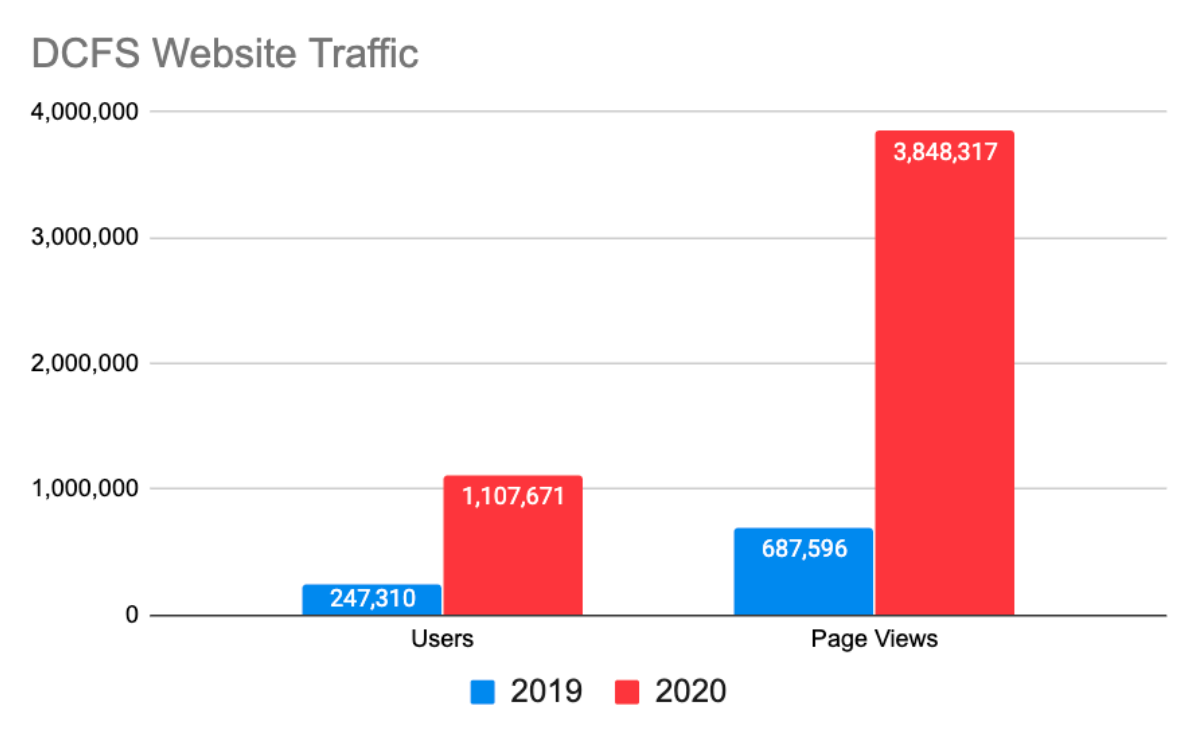- News and Stories
- Blog post
- Safety Net
How Louisiana Rapidly Scaled Pilot Solutions to Combat COVID-19
The COVID-19 virus has pushed our social safety net to the brink of exhaustion. Overwhelmed staff and under-resourced eligibility and enrollment systems are struggling to deliver services to soften the economic and human toll of the pandemic. At Code for America, we’ve seen unprecedented application volume for food assistance, with almost 60% of applicants reporting they had lost a job in the last 30 days compared to just 17% in January 2020.
State leaders are trying to leverage new resources and policy flexibilities to meet exploding demand for services. But office closures, suddenly remote and home-based workforces, and serious safety concerns hamper countermeasures. Now more than ever, state leaders need to work with their clients to develop new and effective responses amid these constraints.
In response to these challenges, the Louisiana Department of Children and Family Services (DCFS) has put people first. Their team created three innovative responses to support clients in one of the hardest-hit areas of the pandemic.
1. Implemented text-message alerts and reminders for the entire state’s SNAP caseload (more than 400,000 households)
Last year, in partnership with Code for America, DCFS and the Louisiana Department of Health (LDH) piloted one-way text message reminders to help clients apply for and maintain important safety net benefits (click here for more details). About 1,000 SNAP clients participated in the program, which showed how effective and efficient text messaging is in supporting clients. Both agencies put text-messaging on their long term agency service roadmaps, and DCFS began considering how to test text messaging further by developing in-house capacity to reach a subset of the SNAP population. The program concluded with a user research workshop in early January 2020.

Less than one week later, the U.S. reported its first confirmed COVID-19 case. As the severity of the crisis deepened, DCFS understood that the agency would need to reach clients quickly and efficiently, in the ways that clients preferred. But, as is the case in most states, developing, launching, and closing a new procurement would take months. At the same time, DCFS was in the middle of modernizing its legacy enrollment and eligibility system, making an internal buildout of new texting capabilities unfeasible.
DCFS found a creative solution by expanding an existing vendor contract to rapidly reach all of the agency’s households. The state went from texting thousands of households in the pilot to hundreds of thousands in a matter of weeks. While DCFS and the vendor refine the delivery of text-based reminders, the outreach is expected to provide clarity on client options and reduce the volume of simple inquiries to the state’s call centers, which are also dealing with pandemic-related constraints.
2. Launched a text-based public campaign to help people understand and apply for Supplemental Nutrition Assistance Program (SNAP) benefits
While the agency was preparing for ways to support existing clients, DCFS also knew a surge of first-time applicants would become eligible shortly. These clients may not understand how to apply, or that food assistance benefits are available at all.
DCFS quickly developed a public awareness campaign with the Louisiana providers of 2-1-1 services, the multipurpose information and referral line. 2-1-1 serves as a directory and referral system for health and human services. DCFS leveraged its existing network and service delivery to develop a specific channel to support the surge of new clients. When participants text “GetSNAP” to a specific number, they receive information on how to apply for SNAP by web or to request an application by mail or email. More than 40,000 people have since texted in to receive information on how to apply. The “GetSNAP” campaign, combined with the mass text alerts to SNAP applicants and recipients contributed to an unprecedented increase in views to the DCFS website. In fact, the site tripled its website users and views between March 16 and May 2.

3. Hired SNAP recipients to provide client feedback on communications and policy decisions
In the Code for America office, there’s a poster that reminds us that we “work with, not for, the people we serve.” We encourage our government partners to do the same, while recognizing that they face more obstacles than an organization with a dedicated qualitative research team.
Governments typically find it difficult to routinely engage clients for in-depth user feedback, especially in navigating procurement and hiring requirements related to reimbursing clients for their time. Some agencies have resorted to hiring a third party marketing firm to gather and reimburse users for feedback, a costly and time-consuming process.
In the turbulent pandemic environment, DCFS knew that getting direct feedback from clients on communications and operational changes would be invaluable. The agency experimented with getting user feedback earlier in the year and now uses an emergency provision for temporary civil service employment to directly hire a panel of current and potential SNAP clients to provide feedback at well above the minimum wage. The panel works from their homes on an hourly, part-time basis, providing feedback “at the drop of a hat.”
One elderly member of the panel noted that readability could be improved with larger text and dark fonts. Director of Communications Catherine Heitman said, “It was so enlightening, so humbling too. Her response was validating.”
The challenges that both clients and caseworkers currently face in safety net services were unimaginable six months ago. We’re encouraged that agency leaders like those in Louisiana are seizing on findings from a small pilot, and creatively fast-tracking implementation to meet the human needs of a pandemic.
If you’re looking for recommendations on how help your state agency respond to the COVID-19 crisis in a human-centered way, you can get directly in touch with us via email: integratedbenefits@codeforamerica.org